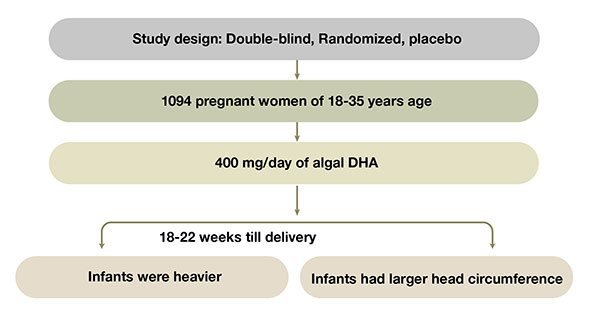The effectiveness and role of docosahexaenoic acid (DHA) has been proved by numerous clinical studies. The polyunsaturated fatty acids (PUFAs) during pregnancy or early postpartum period have been found to have beneficial effects on duration of gestation . A randomized, double-blind, controlled, clinical trial was conducted to determine the effects of increasing DHA intake during the third trimester of pregnancy on overall pregnancy and birth outcomes. The figure depicts the study design and the observations made.

Based on the study outcomes, the following observations were made:
Infant but not maternal red blood cell (RBC) phospholipid DHA increased significantly in the high DHA group.
High-DHA group had a significant increase in duration of gestation of 6.0 ± 2.3 days compared with the ordinary DHA group (276.5 days vs. 270.5 days, p=0.009).
Infants in the DHA supplemented group were significantly longer at delivery (p=0.048) and had a trend toward larger head circumference (p=0.081).
Duration of gestation increased significantly when docosahexaenoic acid intake was increased during the last trimester of pregnancy.
The increase in gestation was similar to that of previously reported interventions with much larger amounts of n-3 long chain polyunsaturated fatty acids
Smuts CM, Huang M, Mundy D et al. A randomized trial of docosahexaenoic acid supplementation during the third trimester of pregnancy. Obstet Gynecol. 2003;101(3):469-479..
During pregnancy, docosahexaenoic acid (DHA) is required physiologically for optimal development and function of the central nervous system. The maternal intake of DHA must be sufficient to maintain maternal tissue stores and meet fetal requirements. A study was conducted to evaluate the effect of prenatal DHA supplementation on gestational age and birth size.

Duration of gestation increased significantly when docosahexaenoic acid intake was increased during the last trimester of pregnancy
The increase in gestation was similar to that of previously reported interventions with much larger amounts of n-3 long chain polyunsaturated fatty acids
Smuts CM, Huang M, Mundy D et al. A randomized trial of docosahexaenoic acid supplementation during the third trimester of pregnancy. Obstet Gynecol. 2003;101(3):469-479..
DHA consumption during pregnancy has previously shown to benefit infant brain and eye development. It may also have an impact on infant adipose tissue development. A longitudinal, randomized, double-blinded, placebo-controlled trial was conducted to evaluate the prenatal impact of a DHA-containing functional food (DHA-FF) on intra-uterine growth of infant.
Healthy pregnant women (n=47)
From week 24 of pregnancy until delivery
DHA-FF or placebo bar
Infant’s length and weight at birth were obtained at delivery and ponderal index (weight (g) / length (cm) 3 x 100) was calculated.
Mothers of infants who consumed DHA-FF during the last half of pregnancy had lower ponderal indices (β=0.198, p<0.05) and umbilical cord blood insulin concentrations (β=0.743, p<0.05) than those who consumed placebo.
DHA supplementation to pregnant women led to lower ponderal indices and lower umbilical cord insulin concentration in infants
DHA consumption during pregnancy may be beneficial for infant body composition at birth and insulin sensitivity.
The increase in gestation was similar to that of previously reported interventions with much larger amounts of n-3 long chain polyunsaturated fatty acids
Courville AB, Harel O, Lammi-Keefe CJ. Consumption of a DHA-containing functional food during pregnancy is associated with lower infant ponderal index and cord plasma insulin concentration. Br J Nutr. 2011;106(2):208-212.
Docosahexaenoic acid (DHA) influences body’s immune function and inflammation; however, the influence of maternal DHA supplementation on incidence of diseases in infants is unknown. A double-blind, randomized, controlled trial was conducted to evaluate the effects of prenatal DHA supplementation on infant morbidity.

Pregnant women
From 18 to 22 weeks' of pregnancy until childbirth
400 mg of DHA supplementation or placebo
In infants of age 1, 3 and 6 months, caregivers reported the occurrence of common illness symptoms in the preceding 15 days
Data were available at 1, 3 and 6 months for 849, 834, and 834 infants, respectively.
The DHA group experienced 26%, 15% and 30% shorter duration of cough, phlegm, and wheezing, respectively at one-month age.
At 3 months, infants in the DHA group spent 14% less time being sick (p<0.0001).
At 6 months, infants in the DHA group experienced 20%, 13%, 54%, 23% and 25% shorter duration of fever, nasal secretion, difficulty in breathing, rash and "other illness," respectively (Figure 1)
DHA supplementation during pregnancy decreased the occurrence of colds in 1-month-old children and influenced duration of disease symptoms in 1, 3 and 6 months old children.
Maternal DHA supplementation significantly decreases disease incidence in infantsImhoff-Kunsch B, Stein AD, Martorell R et al. Prenatal docosahexaenoic acid supplementation and infant morbidity: randomized controlled trial. Pediatrics. 2011;128(3):e505-e512.
Better psychomotor development was previously reported among 30 months old infants whose mothers received DHA supplement in first 4 months of lactation. This study was conducted to assess neuropsychological and visual function of the same children at 5 years of age.

Lactating women
From delivery until 4 months postpartum
High-DHA algal oil (~200 mg/day of DHA) or a vegetable oil (containing no DHA) from delivery until 4 months postpartum.
DHA intake during early infancy confers long-term benefits on specific aspects of neurodevelopment of childrenChildren whose mothers received DHA versus placebo performed significantly better on the Sustained Attention Subscale of the Leiter International Performance Scale (46.5 ± 8.9 vs. 41.9 ± 9.3, p<0.008) (Figure 1).
Duration5-year-old children whose mothers received modest DHA supplementation versus placebo for the first 4 months of breastfeeding performed better on a test of sustained attention. of gestation increased significantly when docosahexaenoic acid intake was increased during the last trimester of pregnancy.
The increase in gestation was similar to that of previously reported interventions with much larger amounts of n-3 long chain polyunsaturated fatty acids
Jensen CL, Voigt RG, Llorente AM et al. Effects of early maternal docosahexaenoic acid intake on neuropsychological status and visual acuity at five years of age of breast-fed term infants. J Pediatr. 2010;157(6):900-905.